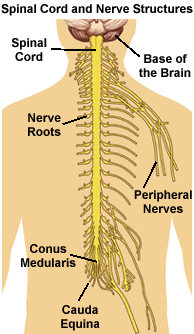Pinched Nerve in the Neck (Cervical Radiculopathy): What You Need to Know
A pinched nerve in the neck, or cervical radiculopathy, occurs when a nerve root in your neck becomes compressed or irritated. This can cause pain, numbness, tingling, or weakness that radiates from your neck into your shoulders, arms, or hands. Let’s explore how this condition occurs, its symptoms, causes, and treatment options, along with important tips to help you find relief.
Understanding the Anatomy: The Key Players
Spinal Cord: The Main Communication Highway
The spinal cord acts as a central "electric cable" carrying signals between your brain and body. It’s protected by vertebrae, which form the spinal column.
Nerve Roots: The Connection Points
At each level of the spinal cord, nerve roots branch out through small openings in the vertebrae. These nerve roots send:
Motor signals to control muscle movement.
Sensory signals to detect touch, pain, and temperature.
In the cervical spine (neck), there are eight cervical nerve roots (C1 to C8), each controlling specific muscles and skin in the neck, shoulders, arms, and hands.
Peripheral Nerves: The Final Pathways
Once the nerve roots leave the spinal column, they form peripheral nerves, which deliver signals to and from specific areas like your fingers or forearm. If a nerve root in the neck is pinched, these signals get disrupted, leading to the symptoms of cervical radiculopathy.
Common Symptoms of a Pinched Nerve
When a nerve root in the neck is compressed, you may experience:
Neck pain radiating into your shoulder, arm, or hand.
Tingling or numbness in the arm, fingers, or hand.
Weakness in the muscles of the arm, wrist, or hand.
Burning or sharp pain that worsens with movements like turning your head or looking down.
What Causes a Pinched Nerve in the Neck?
Several conditions can lead to nerve compression. Here are the most common causes:
1. Degenerative Changes (Cervical Spondylosis)
As you age, the discs between the vertebrae shrink or stiffen, causing bone spurs to form. These bone spurs can narrow the openings through which nerve roots pass, leading to compression.
2. Herniated Disc
A herniated disc occurs when the soft, inner core of a disc bulges through its tougher exterior, pressing on nearby nerve roots. This can happen due to:
Poor posture (e.g., prolonged slouching or excessive phone/computer use).
Repetitive neck movements.
Sudden injuries like falls or heavy lifting.
What Happens When a Nerve Is Pinched?
Compression and inflammation: The nerve root becomes compressed, causing irritation and swelling.
Disrupted signals: The pressure interferes with normal nerve communication between your brain and body.
Potential damage: Prolonged compression can damage the nerve, leading to long-term symptoms.
Is Nerve Damage Permanent?
Temporary effects: In most cases, symptoms improve when the pressure is relieved.
Permanent damage: If left untreated, severe compression can cause long-term weakness, numbness, or reduced muscle function.
How Is a Pinched Nerve Treated?
Most cases of cervical radiculopathy improve with non-surgical treatments. Here are some common options:
Physical Therapy
Stretching and strengthening exercises can relieve pressure on the nerve, improve flexibility, and reduce pain.
Medications
Over-the-counter anti-inflammatory drugs like ibuprofen or naproxen can help manage pain and swelling.
In severe cases, oral corticosteroids may be prescribed for short-term use.
Injections
Epidural steroid injections deliver anti-inflammatory medication directly to the affected area, reducing swelling and pain.
Immobilization
A soft cervical collar may be recommended temporarily to limit movement and allow healing.
Surgery (for severe cases)
If conservative treatments fail after 6-12 weeks, surgery may be necessary to relieve nerve compression. Common procedures include:
Discectomy: Removing part of the herniated disc.
Foraminotomy: Widening the opening where the nerve exits the spine.
How Long Does Recovery Take?
Nerve healing is a slow process. On average, nerves regenerate at a rate of about 1 millimeter per day or 1 inch per month. Recovery time can vary based on the severity of the compression and the treatment used. Mild cases may resolve within 3 to 6 months, while severe cases may take longer or result in incomplete recovery.
Takeaway: Effective Management and Recovery
A pinched nerve in the neck can be painful, but most cases improve with proper care. Understanding the causes and treatment options allows you to take an active role in recovery.
If you’re experiencing persistent neck pain, tingling, or weakness, consult a healthcare professional to develop a personalized treatment plan. With the right care and lifestyle adjustments, you can reduce symptoms and regain function.
How Neuro-Acupuncture Can Help
On our next post, we will discuss how neuro-acupuncture complements conventional treatments and helps accelerate recovery from cervical radiculopathy.
Resources
Cleveland Clinic: Cervical Radiculopathy Overview and Treatment Options
American Academy of Orthopaedic Surgeons: Herniated Disk and Pinched Nerve Facts
Spine-health: Understanding Cervical Radiculopathy Causes and Treatments
National Institute of Neurological Disorders and Stroke (NINDS): Nerve Compression Disorders
Mayo Clinic: Spinal Stenosis and Disk Herniation Information

